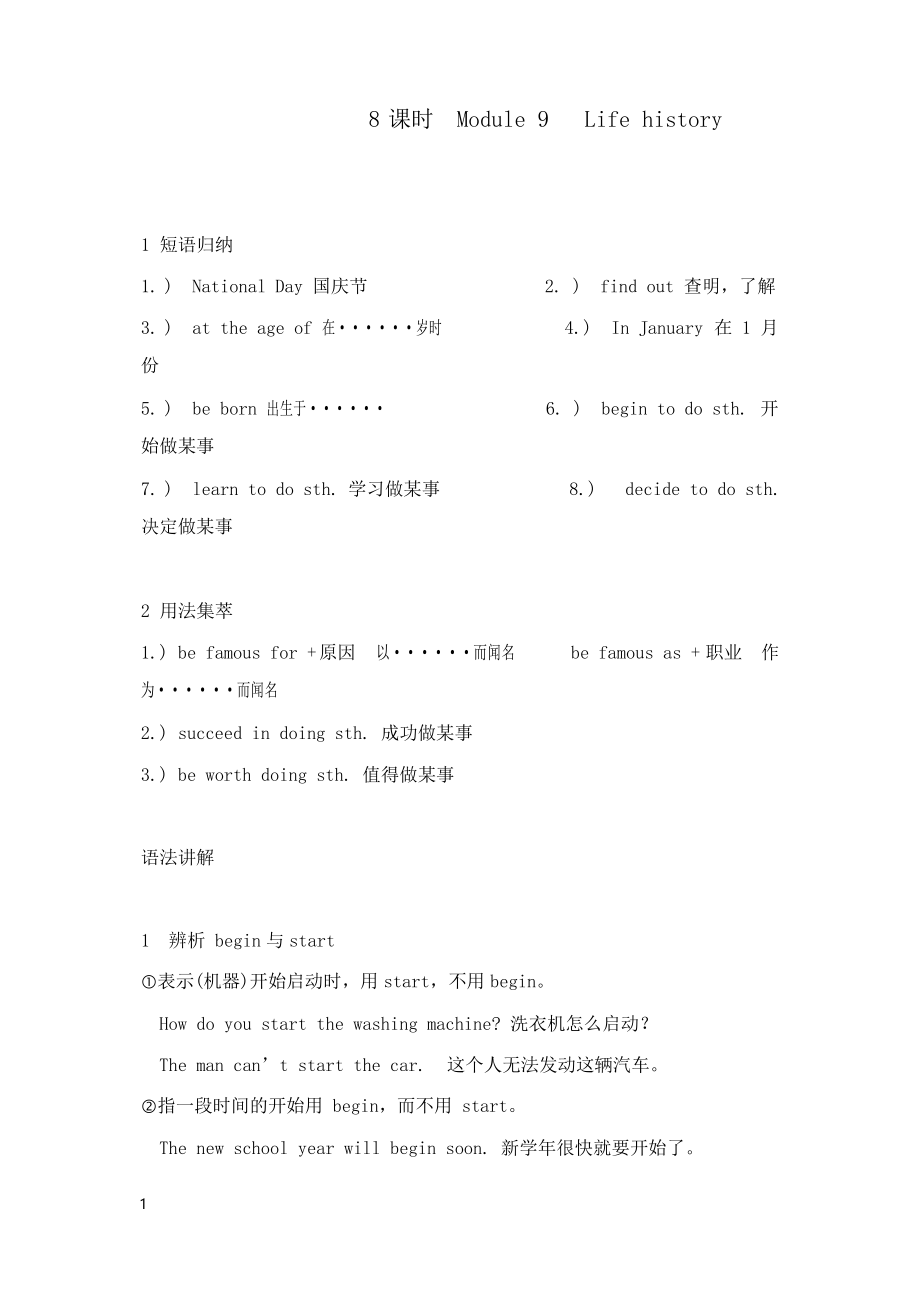《外研版七年級(jí)下冊(cè)module9《life history》教案》由會(huì)員分享���,可在線閱讀���,更多相關(guān)《外研版七年級(jí)下冊(cè)module9《life history》教案(7頁(yè)珍藏版)》請(qǐng)?jiān)谘b配圖網(wǎng)上搜索。
1���、
8?課時(shí) Module?9 Life?history
1?短語(yǔ)歸納
1.?) National?Day?國(guó)慶節(jié) 2.?) find?out?查明,了解
3.?) at?the?age?of?在······歲時(shí) 4.) In?January?在?1?月
份
5.?) be?born?出生于······ 6.?) begin?to?do?sth.?開
始做某事
7.?) learn?to?do?sth.?學(xué)習(xí)做某事 8.) decide?to?do?sth.
決定做某事
2
2���、?用法集萃
1.)?be?famous?for?+?原因 以······而聞名 be?famous?as?+?職業(yè) 作
為······而聞名
2.)?succeed?in?doing?sth.?成功做某事
3.)?be?worth?doing?sth.?值得做某事
語(yǔ)法講解
1 辨析?begin?與?start
?表示(機(jī)器)開始啟動(dòng)時(shí)���,用?start,不用?begin���。
How?do?you?start?the?washing?machine??洗衣機(jī)怎么啟動(dòng)���?
The?man?can’t?
3、start?the?car. 這個(gè)人無(wú)法發(fā)動(dòng)這輛汽車���。
?指一段時(shí)間的開始用?begin���,而不用?start���。
The?new?school?year?will?begin?soon.?新學(xué)年很快就要開始了。
1
2?famous?形容詞���,意為“有名的���,著名的”。
??The?Great?Wall?of?china?is?very?famous?in?the?world.
中國(guó)的長(zhǎng)城在世界上是非常著名的���。
?be famous?for?.?.?.?意為“因······而著名”���,be?famous?as?意為“作
為
4、······(身份)而著名”���。
Beijing?is?famous?for?many?places?of?interest.
北京以許多名勝古跡而著名���。
3 ago?此處用作副詞,意為“·······以前”���,用于一般過(guò)去時(shí)���。
He?went?to?visit?his?parents?three?days?ago.?三天前他去看望了他的父
母���。
辨析?ago?與?before
ago 指從現(xiàn)在算起的一段時(shí)間以前 用于一般過(guò)去時(shí)
before 指某一時(shí)間之前 用于多種時(shí)態(tài)
5、4 or?連詞���,意為“或者”���,常用于否定并列句中。
I?don’t?like?singing?or?dancing.?我不喜歡唱歌和跳舞���。
or?的其他用法:
?.?用于選擇疑問(wèn)句,表示“還是”的意思���。
Would?you?like?or?coffee??你想要牛奶還是咖啡���?
??連接兩個(gè)并列句子,表示“否則���,要不然”之意���。
Hurry?up,?or?you’ll?be?late.?快點(diǎn)���,否則你要遲到了。
2
5?marry
marry?既可用作及物動(dòng)詞���,也可用作不及物動(dòng)詞���,意為結(jié)婚;
6���、嫁���;娶;與......
結(jié)婚等���。
1)marry?sb?表示嫁給某人���;與...... 結(jié)婚。
John?married?Mary?last?week.
2)be/get?married?to?sb?表示與某人結(jié)婚���。
Jane?was?married?to?a?doctor?last?month.
Rose?got?married?to?a?teacher.
3)marry?sb?to?sb?表示父母把女兒嫁給某人或?yàn)閮鹤尤⑾眿D���。
She?married?her?daughter?to?a?businessman.
4)marry?作不及物動(dòng)
7���、詞時(shí),往往用副詞或介詞短語(yǔ)來(lái)修飾���。
She?married?very?early.
6 succeed,?success,?successful
1)succeed “成功”���,是不及物動(dòng)詞;succeed?in?doing?sth
His?plan?succeeded.
At?last?he?succeeded?in?solving?the?problem.
He?succeeded?in?getting?the?job.
���,
2)success n.?表示抽象意義的“成功”?是不可數(shù)的���;表示具體意?義的“成
功的人或事
8、”,?則是可數(shù)的���。
Failure?is?the?mother?of?success.
比較:
He?had?great?success?in?business.
He?was?a?great?success?in?business.
3)successful?成功的?be?successful?in?doing?sth���,
3
The?performance?was?successful.
They?were?successful?in?launching?a?communication?satelli
9���、te.
(他們成功地發(fā)射了一顆通訊衛(wèi)?星)���。
7?as?well?as?意為“也���,還有,而且”可以用來(lái)連接兩個(gè)相同的成分���,如名詞���,
形容詞,動(dòng)詞或者介詞���,通常不位于句首���。
注意:as?well?as?連接的雖然是兩個(gè)名列成分,但是強(qiáng)調(diào)的重點(diǎn)是在前面���,不
在后面���,因此它在連接主語(yǔ)時(shí),謂語(yǔ)動(dòng)詞在人稱和數(shù)上要與前一項(xiàng)保持一致���。
Tom,?as?well?as?Jane?and?Mike?,?goes?to?school?by?bus.
除了簡(jiǎn)和邁克外���,湯姆也乘公車去上學(xué)���。
8?worth?值得。?Be?worth?doing?.... 值得做...
10���、
拓展???be?worthy?of?doing?sth.?值得做某事
He?is?worthy?of?filling?the?post?.?這個(gè)職位他當(dāng)之無(wú)愧
??be?worthy?to?do?sth.?值得做某事
He?is?worthy?to?fill?the?post.?這個(gè)職位他當(dāng)之無(wú)愧
重點(diǎn)語(yǔ)法:一般過(guò)去時(shí)
一般動(dòng)詞過(guò)去式的基本句型如下:
肯定句:?主語(yǔ)+?動(dòng)詞的過(guò)去式……
否定句:?主語(yǔ)+?did?not?+?動(dòng)詞原形……
疑問(wèn)句:?Did?
11���、+?主語(yǔ)?+?動(dòng)詞原形……?
?played?tennis?last?week. (肯定句?) 他上周打網(wǎng)球了���。
4
?did?not?play?tennis?last?week. (否定句) 上周他沒打網(wǎng)球���。
○Did?he?play?tennis?last?week? (疑問(wèn)句) 上周他打網(wǎng)球了嗎?
※一般動(dòng)詞過(guò)去時(shí)的疑問(wèn)句
Did?he?go?there? 他去那了嗎���?
Yes,?he?did. (No,?he?didn’t.) 是的���,他去了。?(不���,他沒去。)
When?did?you?get?up?this?mornin
12���、g? At?six.
今天早晨你幾點(diǎn)鐘起床的���? 六點(diǎn)鐘���。
【典型例題】
I.?用所給詞的適當(dāng)形式填空。
1.?Mike?_________________(not?go)?to?bed?until?12?o’clock?last?night.
2.?There?_________?(be)?no?one?here?a?moment?ago.
3.?I?___________?(call)?Mike?this?morning.
4.?Last?week?we?_________?(pick)?many?apples?on?the?farm
13���、.
5.?My?mother?________________?(not?do)?housework?yesterday.
6.?She?watches?TV?every?evening.?But?she?_______________?(not?watch)
TV?last?night.
7.?There?____________?a?telephone?call?for?you?just?now.?(be)
(
8.?There?__________?not?enough?people?to?pick?apples?that?day. be)
9.?T
14���、here?_____________?any?hospitals?(醫(yī)院)?in?my?hometown?(家鄉(xiāng))
in?1940. (?be?not)
10.?–When?_______?you?_________?(come)?to?china?
11.?Did?she?________?(have)?supper?at?home?
12.?Jack?____________?(not?clean)?the?room?just?now.
13.?_________?(be)?it?cold?in?your?city?yesterday?
14.?How?
15、many?people?________?(be)?there?in?your?class?last?term?
5
15.?It?________?(be)?hot?yesterday?and?most?children?_______?(be)
outside.
II.?詞匯���。根據(jù)句意或首字母提示寫單詞���。
1.?T________?comes?after?Monday.
2.?Li?Lei?is?a?tall?boy.?His?legs?are?very?l________?.
3.?O________?of?you
16、r?hands?is?dirty(臟的).?You?must?wash?it.
4.?T________?the?basketball?to?me,?please
5.?I’m?not?good?at?p________?basketball,?but?I?do?well?in?English.
IV.?根據(jù)句意及首字母補(bǔ)全單詞
1.?New?Year’s?Day?is?on?J___________?the?first.
2.?M___________?the?first?is?Labour?Day
3.?We?love?our?t
17���、eachers.?We?say?“Happy?Teachers’s?Day!”on?S__________
the?tenth.
4.?Our?second?s?chool?–term?lasts?from?F__________to J__________.
5.?June?the?first?is?C___________Day.
6.?O__________?the?first?is?our?National?Day.
7.?We?can?make?a?snowman?in?w_____________.
8.?September?is?the?n__
18���、_______?month?of?the?year.
9.?D____________?the?twenty-fifth?is?Christmas?Day.
10. —?Which subject?(?學(xué)?科?)?do you like best? —?I like
H_______________.
V.?單項(xiàng)選擇。
1.?He?_______?in?1998.
6
A.?is?born
C.?was?born
�B.?is?birth
D.?was???birth
2.?Who
19、?writes?_______?,?Jim?,?Kate?or?John??
A. more?carefully
C.?the?most?careful
�B.?the?most?carefully
D.?more?careful
3.?—Is?this?orange?sweater?Li?Ying’s?or?Lucy’s??—________?.
A.?Yes,?it’s?Lucy’s
C.?No,?it’s?mine
�B.?No,?it’s?Lucy’s
D.?It’s?Lucy’s
4.?I?was?b
20���、orn?_____?April?20,?1985?_____?the?north?____?China.
A.?in,?in,?of
C. on,?in,?of
�B.?in,?on,?of
D.?on,?on,?in[
5.?—How?many?brown?boxes________?? —Two.
A.?do?you?have
C. are?you?have
�B.?is?there
D.?does?you?have
7
 外研版七年級(jí)下冊(cè)module9《life history》教案
外研版七年級(jí)下冊(cè)module9《life history》教案

